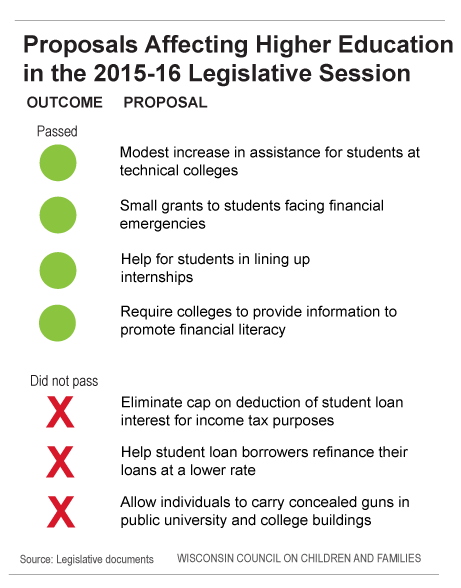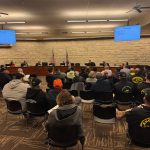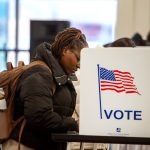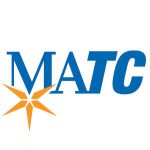Little Help for College Students in Debt
Legislature’s small changes dwarfed by cutbacks in UW funding.
This month Wisconsin state lawmakers wrapped up the legislative session that began in January 2015. In this session, they passed several minor bills to expand opportunity for college students, but did not address the issue of helping students who graduate with a large amount of student loan debt.
The legislature is scheduled to be out of session for the rest of the year. Occasionally lawmakers call for a special session of the legislature that is not on the regular schedule, but assuming they do not do that, they will next meet in January 2017. Bills that did not pass during this session can be brought up again at that time, but will have to start the process over.
Small increases in assistance for college students
Bills that passed this session had the following effect:
- Increasing need-based grants for technical college students by $500,000 per year. (Assembly Bill 470/Senate Bill 540)
- Creating small grants for college students in emergency financial need. Students who have a emergency that could cause them to drop out of school are eligible to receive a $500 grant to help them cover costs. The total cost for this proposal is $450,000 per year. (AB741/SB592)
- Helping students get internships. Legislators approved $200,000 to create two positions at the Department of Workforce Development that will work with employers and educational institutions to place students in internships. (AB 742/SB594)
- Requiring colleges and universities to provide a letter to students with information about the loans and financial aid that student receives, the expected cost of attending the institution, and other resources to learn more about student loans and financial literacy. (AB744/SB595).
These bills were part of a package proposed by Governor Scott Walker aimed at making higher education more affordable.
No action on student loan debt
Legislators declined to pass the only part of the Governor’s package that had more than a minimal cost: an elimination of the cap on the tax deduction for student loan interest. This proposal would have reduced taxes for 32,000 student loan payers in Wisconsin by a total of $5.2 million a year. Taxpayers with higher incomes would not have received a tax break. (AB739/SB622)
The legislature did not take action on a bill called “Higher Ed, Lower Debt” put forth by Democratic lawmakers that would have reduced the cost of repaying student loans. The proposal would reduce income taxes for student loan borrowers by $109 million a year by allowing borrowers to deduct more of their repayments and by changing income eligibility requirements. The bill also would have established a student loan refinancing authority through which borrowers could refinance their loans at lower rates. (AB 272/SB194)
Lawmakers did not take action on a bill that would have allowed individuals to set up tax-exempt savings accounts to pay for higher education and other expenses for people with disabilities. That proposal would have reduced state income tax collections by $5.9 million annually. (AB 236/SB165)
No concealed weapons in college buildings
Legislators did not approve a bill that would have allowed individuals to carry concealed weapons inside public university and college buildings. University officials strongly opposed this bill. (AB480/SB363).
Wisconsin Budget
-
Charting The Racial Disparities In State’s Prisons
 Nov 28th, 2021 by Tamarine Cornelius
Nov 28th, 2021 by Tamarine Cornelius
-
State’s $1 Billion Tax Cut Leaves Out 49% of Taxpayers
 Sep 21st, 2021 by Tamarine Cornelius
Sep 21st, 2021 by Tamarine Cornelius
-
TANF Program Serves a Fraction of Poor Families
 Aug 30th, 2021 by Jon Peacock
Aug 30th, 2021 by Jon Peacock






















